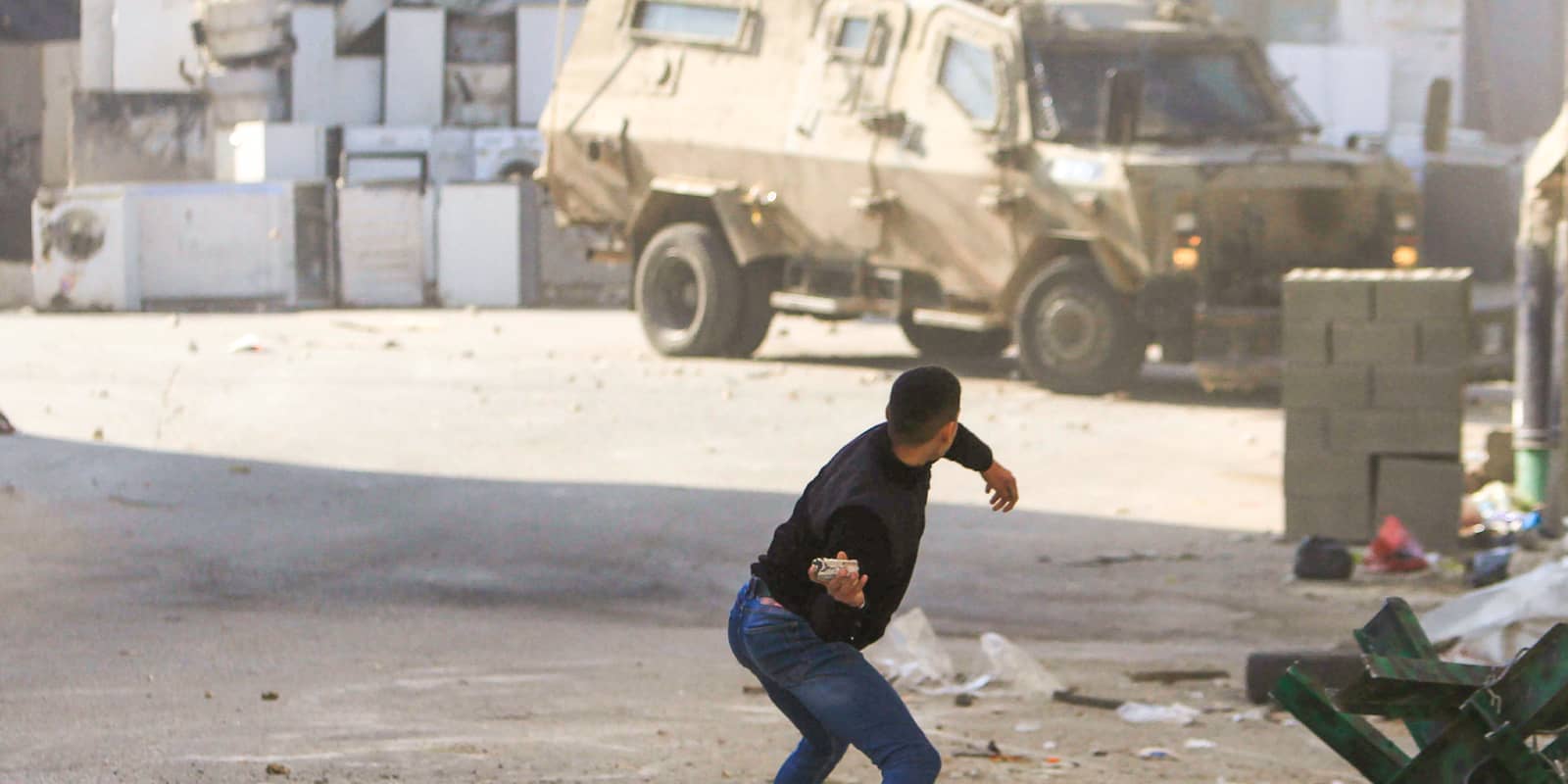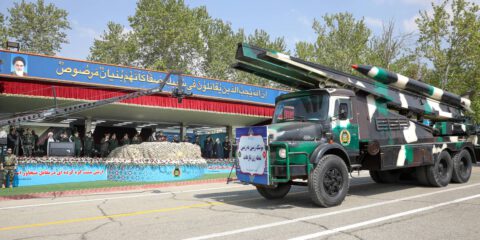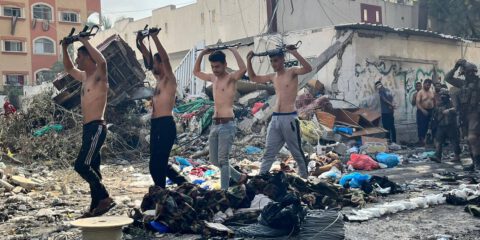A proposed framework for Palestinian civil management in Gaza, and Judea and Samaria for the ‘day after’ the Gaza War. Any future Palestinian administration will need to completely change the educational curricula, end nepotism and corruption, and dismantle all mechanisms for for perpetuating Palestinian refugee status
With the IDF on the way to achieving full operational freedom throughout the Gaza Strip, Israel must prepare for an initial period of chaos, during which it will be required to provide an immediate response to the civil needs of the residents of the Gaza Strip remaining under its control. At the same time, it will have to destroy terrorist infrastructures and eliminate Hamas terrorists remaining in the area who have not laid down their arms. In the absence of a mechanism able to take upon itself the management of the territory and its population, in view of the scale of the destruction and with most of the northern part of the Gaza Strip unfit for human habitation – and likely to remain so for a long time – we can expect to see the emergence of violence between groups in the Gaza Strip. This could also affect Israel. The civilian population will not have access to adequate health services. Education, health and employment systems can be expected to only partially function, and the overall picture, which will be leveraged by the Palestinians and the international media, will be that of a severe humanitarian crisis.
Prime Minister Benjamin Netanyahu has made it clear that the Palestinian Authority (PA) will have no foothold in Gaza; his position enjoys broad public support. Three decades of Palestinian Authority rule have shown it to be – through most of that time – a failed, corrupt and illegitimate entity, devoid of domestic legitimacy. The PA has also become a major instrument in building a Palestinian consensus that denies the right of the Jewish people to self-determination. The PA has systematically incited against Israel and the Jews and delegitimized Israel.
The Palestinian Authority has succeeded in cementing such perceptions through school curricula, incitement in mosques and the statements of senior PA officials in the media. The PA supports terrorism by paying salaries to terrorists imprisoned in Israeli jails and their families. So far, no PA official has condemned the atrocities committed by Hamas on October 7. In addition, many schools under the PA’s jurisdiction glorify the massacre. It is clear that after the war it will be necessary to reexamine the situation in Judea and Samaria as well.
The main challenge in the Gaza Strip will be to reduce the security risks faced by Israel. Once the war is over, Israel’s military and security forces will continue an ongoing campaign aimed at completing the de-Hamasification of the Gaza Strip by eliminating terrorists who refuse to lay down their weapons and destroying Hamas’ military and governmental infrastructure. At the same time, a mechanism for civil management of the territory and its population will be required. The first stage will necessarily focus on the immediate needs of the population, especially food, water, and basic health and sanitation services. Later on, more complex needs will need to be addressed, such as education, employment, advanced health services, environment, communications, infrastructure, etc.
The emergence of local leadership that will be acceptable to the majority of the population is unlikely. Therefore, an international support package is required. The best way would be in the form of a trustee regime, whose composition will need to be debated. It should include elements from neighboring Arab countries, belonging to the more pragmatic camp led by Egypt and Saudi Arabia and supported by the United States. While it is difficult at this point to guarantee that they will agree to this, if attractive incentives are offered, this may suffice, particularly if they are convinced that their participation contributes to a favorable reorganization of the regional architecture.
This trustee regime will assume responsibility for addressing the immediate civilian needs of the population and will manage the territory while creating the conditions for the development of local leadership. Thousands of Palestinian Authority employees who are not affiliated with Hamas can be used as the foundation for an effective civilian technocratic regime. This is a process that could take many years.
In the new reality in the Gaza Strip, Israel’s coordination and liaison administration (COGAT) should be dismantled to ensure complete Israeli civilian disengagement from the Gaza Strip. A similar process should be examined in Judea and Samaria to create an alternative organizational structure to the PA.
Building a Palestinian civil-technocratic regime in Gaza should be a model for Judea and Samaria (a revitalized Palestinian Authority – as defined by President Biden in his article in The Washington Post). The administration apparatus in Gaza will operate independently of the existing one in Judea and Samaria. The idea of dividing Judea and Samaria into several separate civilian administrative zones should be considered. The overall security responsibility will remain in the hands of Israel, thereby ensuring complete operational freedom of action. The security forces of the existing PA will be dismantled and equipped to enforce law and order without any offensive capability. Past experience shows that any paramilitary capability held by the Palestinians becomes an offensive military capability. For example, the existing commando units of the Palestinian Authority built with the support of American training and equipment, have offensive capability. These units may act against Jewish communities in Judea and Samaria and even the State of Israel.
In parallel, one of the first tasks of the emerging Palestinian administration is a complete change in the educational curricula. The supporting international envelope must ensure that the curricula no longer contain inciting and violent content. Similarly, paying salaries and allowances to terrorists detained and imprisoned in Israel, or to the families of terrorists must stop.
A major task will be to prevent the corruption and nepotism that is currently prevalent in the PA. To this end, it is necessary to ensure that all rehabilitation projects, those involving large budgets, are carefully and stringently audited, which will ensure that the funds are channeled to their original destination and not into the pockets of the bureaucracy or the leadership.
A third task is preparing a foundation for any future consensual arrangement, something that cannot happen when the two foundational pillars of the Palestinian ethos are the “right of return” and the “armed struggle.” To this end, all mechanisms for perpetuating Palestinian refugeehood must be dismantled. (The definition of a Palestinian refugee is unique in that it is expanded to include subsequent generations, something that does not apply to any other class of refugees in the world). The mechanisms for perpetuating Palestinian refugeehood are the refugee camps and UNRWA. There is no justification for the continued existence of these two anchors of the refugee ethos, which have not promoted the Palestinian refugee population or its welfare and have done nothing to advance the building of a Palestinian state or Palestinian independence.
If the international trusteeship succeeds in building a well-functioning civilian administration in the Gaza Strip, then it will be possible to adopt the same model in Judea and Samaria as well, while examining the possibility of dividing the territory into several separate civil administration zones. The proposed format could become the infrastructure for a Palestinian federation including Gaza and the cantons in Judea and Samaria.
The new Palestinian administrative structure should be incorporated within the framework of the new regional architecture. It might evolve into a Jordanian-Palestinian confederation. The chances of this happening may increase if the countries of the region, together with Israel, and with the support of the United States, return to a normalization process between Israel and the Arab states in the region, with an emphasis on Saudi Arabia.
A third task is preparing a foundation for any future consensual arrangement, something that cannot happen when the two foundational pillars of the Palestinian ethos are the “right of return” and the “armed struggle.” To this end, all mechanisms for perpetuating Palestinian refugee status must be dismantled. (The definition of a Palestinian refugee is unique in that it is expanded to include subsequent generations, something that does not apply to any other class of refugees in the world). The mechanisms for perpetuating Palestinian refugeehood are the refugee camps and UNRWA. There is no justification for the continued existence of these two anchors of the refugee ethos, which have not promoted the Palestinian refugee population or its welfare and have done nothing to advance the building of a Palestinian state or Palestinian independence.
JISS Policy Papers are published through the generosity of the Greg Rosshandler Family.
Photo: IMAGO / Sipa USA








 - בניית אתרים
- בניית אתרים